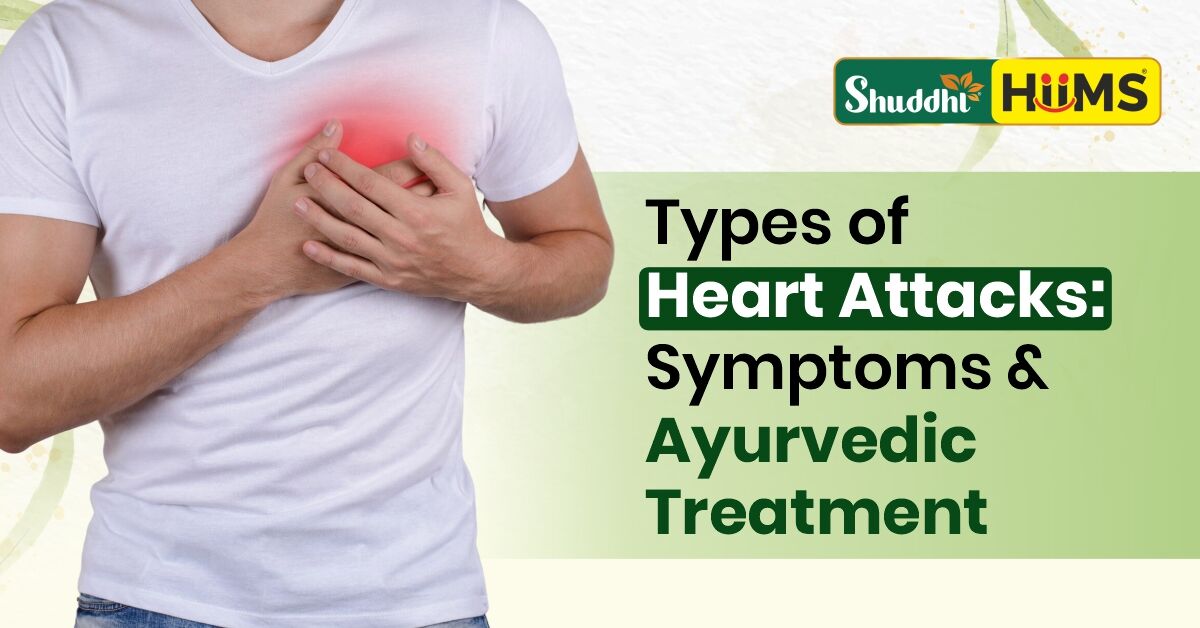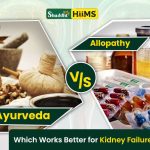Types of Heart Attacks: Symptoms & Ayurvedic Treatment

24 Jul, 2025
Types of Heart Attacks: Symptoms & Ayurvedic Treatment
Every scroll through the news or social media brings a chilling headline – another young life lost to a sudden heart attack. It’s no longer rare or distant. People in their 30s and 40s, with no major medical history, are now facing heart-related emergencies. Naturally, there’s growing anxiety about how I can tell whether I am at risk, what signs I should never ignore, and whether I can support my heart without depending completely on chemicals. These are real, urgent questions. Understanding your heart’s signals is essential. In this blog, we’ll explore the types of heart attacks, how to recognize early signs of heart attack, and how Ayurvedic Treatment for Heart Attack supports long-term heart health naturally.
What Is a Heart Attack?
A heart attack occurs when blood flow to a part of the heart is interrupted, usually because of a blockage in the arteries. This blockage is typically caused by plaque buildup, a mix of fat, cholesterol, and other substances that clog the blood vessels. When the blockage becomes too severe, oxygen doesn’t reach the heart muscles, leading to damage.
Types of Heart Attacks
Not all heart attacks are the same. Some are emergencies, some happen quietly, and some are warning signs. Understanding their types can help you act early and wisely.
1. STEMI – The Severe One
This is a full blockage in one of the major arteries supplying the heart. It needs immediate medical attention.
Common symptoms:
- Intense chest pressure or tightness
- Pain radiating to the left arm, back, or jaw
- Shortness of breath
- Cold sweats and dizziness
- Nausea or vomiting
2. NSTEMI – The Silent Damager
Here, the artery is partially blocked. Blood still flows, but not enough to keep the heart healthy. Damage happens slowly and may not be easily noticeable.
Warning signs:
- Light chest pain
- Tiredness or discomfort
- Symptoms can be aggravated by stress or exercise
3. Unstable Angina – The Alarm Bell
It is a precursor stage of a heart attack. The arteries might constrict or squeeze intermittently, reducing the blood flow, but have not suffered complete damage yet.
Early signs of heart attack here include:
- Chest pain during rest
- Unpredictable discomfort
- Repeated short episodes of tightness
Even if the pain fades quickly, it should never be ignored. It might be the body’s way of giving you a second chance.
Heart Attack Symptoms You Shouldn’t Ignore
While chest pain is the most well-known symptom, many people experience less obvious signs, especially women and diabetics. Be alert if you notice:
- Unusual fatigue
- Indigestion or a heavy stomach feeling
- Pain in the neck or jaw
- Lightheadedness or fainting
- Shortness of breath during rest or mild activity
These are symptoms that need timely attention even if they don’t feel “serious” at first.
Ayurvedic Treatment for Heart Attack
Once the emergency phase of a heart attack is over or if you’re at risk due to high BP, cholesterol, diabetes, or family history, Ayurveda offers a holistic, restorative approach. The focus is on strengthening the heart, improving circulation, and balancing the body and mind naturally.
The ayurvedic Heart Disease Treatment offered at Shuddhi HiiMS is individualised. It does not merely treat symptoms but also knows your Prakriti (body type), balances the root causes and helps achieve a long-term cardiac health.
1. Targeted Herbal Formulations
Customized herbs form the backbone of therapy:
- Arjuna: Strengthens heart muscles and supports circulation
- Pushkarmool: Eases chest discomfort, balances Vata
- Kutki & Punarnava: Cleanse the liver and kidneys, as well asthe heart health
- Amla & Pomegranate: Maintain artery flexibility and cholesterol balance
2. Hridaya Basti: Ayurvedic Therapy for the Heart
A specialised treatment at HiiMS where a dough ring is used to keep warm medicated oil over the heart region. This:
- Relaxes anxiety and emotional stress
- Strengthen cardiac muscle
- Facilitates good blood circulation
- Maintains heart tissues and balances dosha
3. HIIMS’ Natural Emergency Protocol
Recommended under Acharya Manish Ji’s guidance to offer immediate relief while awaiting medical care:
- Step 1: Chew Raw Ginger
Chew a 2-inch piece of raw ginger. It should bring tears to the eyes. This helps stimulate circulation. - Step 2: Squat Carefully
Sit in a squatting pose, with a straight back. This will lessen the heart burden. - Step 3: Drink Warm Water
Drink lukewarm water slowly. It promotes blood circulation and can relieve pain.
These steps are temporary and not a replacement for emergency care.
4. Diet & Lifestyle Correction
Personalised plans focus on:
- Light, sattvic meals
- Avoiding oily, heavy, and processed foods
- Including garlic, turmeric, moong dal, bottle gourd
Daily walking, gentle yoga, and Pranayama help improve heart function and emotional stability.
5. Emotional Wellbeing for Heart Health
Emotional stress is closely linked to heart conditions. So, care includes:
- Ayurvedic counselling
- Meditative techniques
- Guided breathing for emotional regulation
These support a calmer mind and a healthier heart.
Final Thoughts
Being familiar with the various Types of Heart Attacks places you one step above. Whether it is silent damage or sudden blockage, the answer lies in awareness, early detection, and long-term care. While modern medicine is vital in emergencies, Ayurvedic Heart Disease Treatment adds a sustainable layer of prevention and recovery.
At Shuddhi HiiMS Ayurvedic Hospitals, the path to heart wellbeing is always taken care of by balance, purification, and a daily dose so you can start each day with strength, not in fear.
FAQs
1. How does Ayurveda support recovery after a heart attack?
With the help of natural treatments to strengthen the heart, increase circulation ,and decrease stress.
2. What is the role of Hridaya Basti in heart care?
It relaxes the chest area, boosts blood flow, and nourishes heart tissues.
3. Which herbs are commonly used in Ayurvedic heart treatment?
Arjuna, Pushkarmool, Punarnava, Kutki, and Amla are key ingredients.
4. Can Ayurvedic treatment be combined with ongoing allopathic medication?
With expert guidance, both approaches can complement each other for better outcomes.
5. How does Ayurveda handle emotional stress related to heart issues?
Through calming practices like meditation, breathwork, and Ayurvedic counselling.





